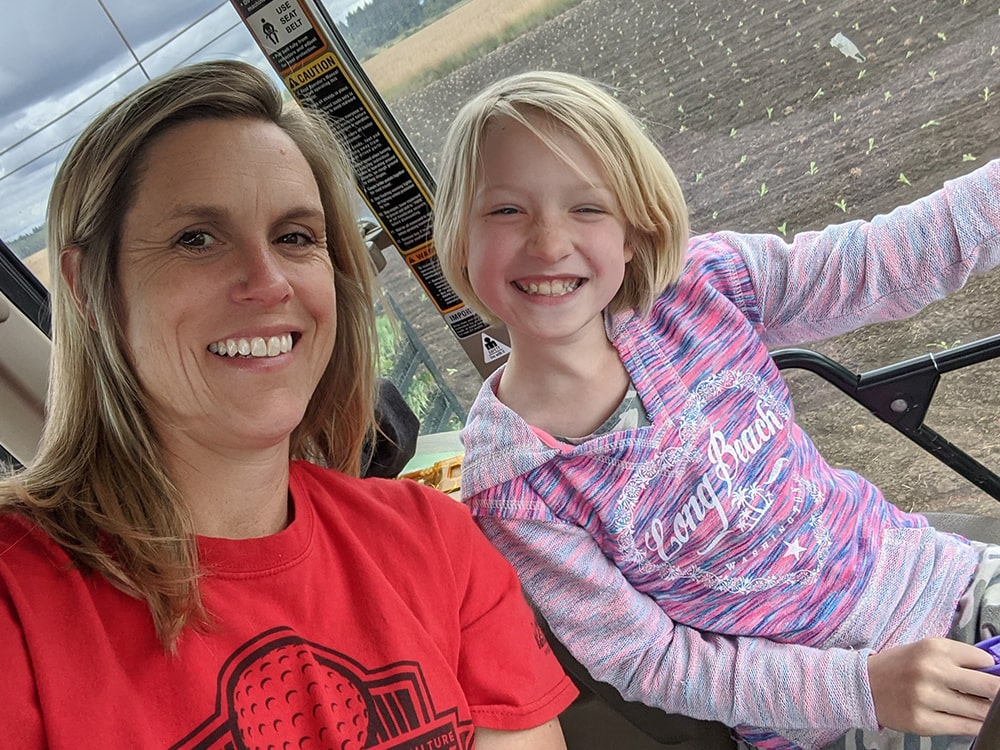Co-op Member Spotlight: Pearmine Farms, Gervais, OR
Molly McCargar, Pearmine Farms
History runs deep for Wilco members Molly McCargar and her brother Ernie Pearmine. As fourth generation farmers to carry on the nearly 100-year farming legacy at Pearmine Farms in Gervais, OR, the siblings agree that they naturally fell into rolls working together on their diverse crop farm that runs along the Willamette River. “Ernie and I get along so well,” says Molly. “Our 8-year-age gap and the fact that I used to coach he and his buddies little league team may be part of that, but we have a unique and fun working relationship,” Molly added.

While Ernie returned to the family farm immediately after graduating from OSU with a business degree and a minor in horticulture, it took Molly a little longer to return to her roots. After attaining a teaching degree from Western Oregon University, Molly taught high school health and coached varsity volleyball and varsity softball for many years. “I swore I wasn’t going to do it, but after I had my second daughter in 2005, Pearmine Farms’ bookkeeper retired and my dad asked me if I wanted to take on the roll part time, so I went from that to TODAY,” Molly said, as they prepare for their busy season on the farm. She and her husband Lindsay have four daughters who help with cauliflower production and irrigation, and while her last year of full-time coaching was 2008-2009, she has returned to Gervais High School this past year as the Varsity Volleyball and Assistant Basketball coach.

If you met Molly today, you could hardly imagine that she’s done anything but farm. She oversees Pearmine Farms cherry production and harvest, which is their longest standing crop, dating back to her great-grandparents who managed orchards in the 1930’s in Salem/Keizer. Molly’s great grandmother was part of the original Willamette Cherry Growers co-op board in 1932, and her family has been an integral part of the Oregon cherry business ever since. Pearmine Farms original cherry orchard was planted by her grandparents in Gervais in the 1950’s and is the same orchard Molly will harvest from in a few months.
When their dad, Ron, and his brother Larry took over the farm in the ‘70’s, they transitioned away from grains and livestock and focused on vegetable row crops and cherries. Beans and broccoli have all been planted in their fields, but the one that has stood the test of time is cauliflower. Their first cauliflower contract was in 1974 and is still a crop that they grow today.

They also grow hops, which Ernie oversees, and field corn, winter squash and some grass seed. Red clover seed is also in the crop rotation as needed, which changes from time-to-time. “We look at what the need is and what the demand is in the marketplace and what we can fit into rotations outside of year-round crops, and that’s how we decide on what crops to plant,” Molly explained.
While Larry retired in 2011 and their dad still helps out as needed, Molly says that they instilled in them the importance of partnerships and always striving to do better. “Our roots run deep with OSU and the research and development stages,” Molly said. “We were a pilot farm for cultivating the original Marionberry roots as an example,” she added. “We’re always up for a good experiment.”

Other important partners in keeping their operation flowing is the support from their Valley Ag agronomist, which runs two-generations deep. “We’ve been Wilco members since day one,” Molly said. “My grandfather was part of the Donald Co-op, which merged to form Wilco. Our loyalty to them is because of their loyalty to us. They show up and check up on us when we’re not asking. That customer service adds a lot of value to us,” McCargar said. She also added how much they value how Wilco gives back to the community with their support of youth organizations like FFA and 4-H. “It’s nice that you have a company that can do that. They walk the talk, and I appreciate it,” Molly added.
McCargar also sees community involvement as a big part of her role in the farming community. “Outside of dealing with weather pattern shifts and trying to adjust in real time to how it affects the crops we grow, legislation being pushed by folks without a true understanding of the impact of that legislation is our greatest challenge,” Molly said. That’s why she spends so much time advocating for agriculture. She sits on the boards of REAL Oregon, Oregon Aglink, Farmers Ending Hunger, and is part of the Oregon Farm Bureau’s Labor Advisory Committee.

“The best part of farming is knowing that you’re providing food and fiber for people,” McCargar said. “It’s really cool knowing that we’re the start of production, and when it leaves our farm it’s sent around the world for other people to enjoy.”

